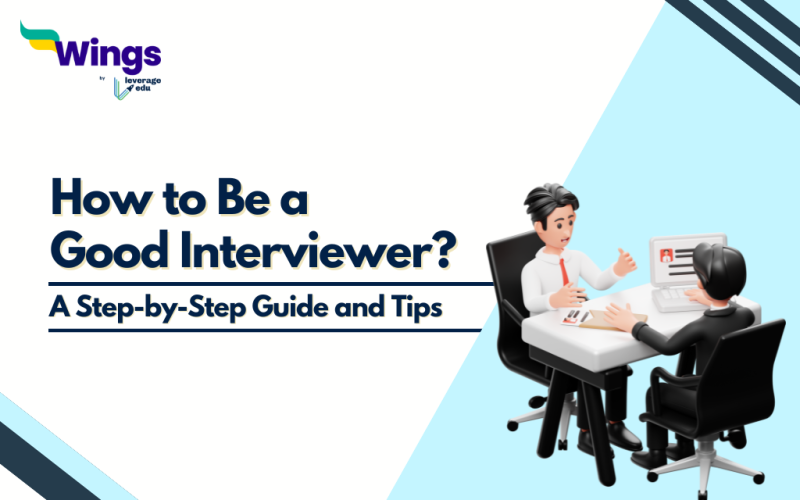How to be a good interviewer? To become a good interviewer, it is important to prepare thoroughly, create a comfortable environment, build rapport with the candidate, ask open-ended questions, take notes, and follow up. While following these steps, you as an interviewer must ensure that you maintain professionalism, listen carefully, and be empathetic throughout the interview. To gain more insightful details on becoming a better interviewer, you must read the blog and take away the relevant information.
This Blog Includes:
Learn About the Do’s and Don’ts When Starting a New Job
How to Be a Good Interviewer?
Here is a step-by-step guide to becoming a good interviewer:
Step 1: Prepare Thoroughly
Before the interview, you should review the candidate’s resume and the job description to understand their background and the role’s requirements. This ensures you can ask relevant questions and assess the candidate effectively during the interview process.
Step 2: Create a Comfortable Environment
Thereafter, make the interviewee feel welcome by greeting them warmly and offering them a drink. You should establish a relaxed atmosphere to encourage open communication. This enables the candidate to feel more at ease and enables her/them/him to perform her/their/his best.
Step 3: Build Rapport
You must begin the interview with some light conversation to establish a connection with the candidate. This enables a positive and friendly atmosphere, which encourages the candidate to share relevant information during the interview, without hesitation.
Step 4: Ask Open-Ended Questions and Take Notes
Throughout the interview, pose questions that require more than a simple yes or no answer. This is essential because open-ended questions encourage candidates to provide detailed responses, allowing you to gain deeper insights into their skills, experiences, and qualifications.
Also, keep detailed notes during the interview to record key points and observations. Note-taking helps you remember important details and compare candidates later on, ensuring you make well-informed decisions during the hiring process.
Step 5: Follow Up
After the interview, provide timely feedback to candidates, regardless of the outcome. You must understand that constructive feedback enables candidates to understand areas for improvement. Also, it reinforces a positive candidate experience, reflecting well on your organization’s reputation.
Read this Blog to Understand What is a 360 Degree Feedback.
Tips on How to Be a Good Interviewer
After getting the answer to ‘How to be a good interviewer’, it is time for some tips to become an effective interviewer. The next time you interview a potential candidate for your company, you must maintain professionalism, be empathetic, be mindful of biases, and listen actively. Here are some tips:
- Listen Actively: You need to focus on what the candidate is saying without interrupting or formulating your response while they speak. By listening actively, you demonstrate respect and understanding. This would help you gather valuable information and evaluate the candidate effectively.
- Be Empathetic: Furthermore, you need to recognize that interviews can be nerve-wracking for candidates. Thus, you must show empathy and understanding throughout the process by offering encouragement and support to the candidate.
- Be Mindful of Biases: You should avoid making assumptions or judgments based on stereotypes or personal biases. You can evaluate candidates objectively based on their qualifications, skills, and fit for the role, ensuring fairness and equal consideration for all applicants.
- Maintain Professionalism: Lastly, you must professionally conduct yourself throughout the interview by dressing appropriately, being punctual, and treating the candidate with courtesy and respect. By upholding professional standards you demonstrate your organization’s commitment to integrity and professionalism.
Learn About Overcoming Imposter Syndrome at Work
Traits of a Good Interviewer
To become a good interviewer, you must possess a blend of interpersonal skills and strategic thinking to assess candidates effectively. Here are some key characteristics of an impactful interviewer that stand out:
- Communication Skills: This includes active listening, where you attentively hear and understand the interviewee’s responses. It also involves clear and concise questioning that allows for in-depth exploration of their skills and experiences.
- Organizational Skills: In addition, you must understand that a structured interview approach ensures you cover all essential areas and allows for efficient use of time. Therefore, you must organize and plan the interview accordingly.
- Assessment Skills: You must be able to look beyond the resume and identify the interviewee’s potential to learn and grow. Also, you must evaluate the candidate’s ability to adapt to the role and the company’s work culture.
- Body Language Expertise: Also, you need to pay close attention to nonverbal cues that can provide additional insights into the candidate’s responses and overall confidence.
- Knowledge about Job and Company: A strong understanding of the specific role and the company’s values allows you to tailor your questions. Furthermore, it helps you assess if the candidate is a good fit for the role.
- Emotional intelligence: Being aware of your emotions and possessing the ability to recognize the candidate’s feelings would help you foster a genuine connection with the candidate. Also, this connection helps you and the candidate to navigate the interview effectively.
Understanding the Importance of Communication Skills to Succeed at Work
FAQs
Ans: Here are the steps to become a good interviewer:
Step 1: Prepare Thoroughly
Step 2: Create a Comfortable Environment
Step 3: Build Rapport
Step 4: Ask Open-Ended Questions and Take Notes
Step 5: Follow Up
Ans: Here are some traits of a good interviewer:
1. Good communication skills
2. Effective organisational skills
3. Impactful assessment skills
4. Body language expertise
5. Emotional intelligence
Ans: Here are some effective tips:
1. Listen actively
2. Be empathetic
3. Be mindful of biases
4. Maintain professionalism
Explore Some More Interesting Topics to Elevate Your Career
Follow Leverage Edu for more informative and interesting blogs on career counselling.
 One app for all your study abroad needs
One app for all your study abroad needs














 45,000+ students realised their study abroad dream with us. Take the first step today.
45,000+ students realised their study abroad dream with us. Take the first step today.

